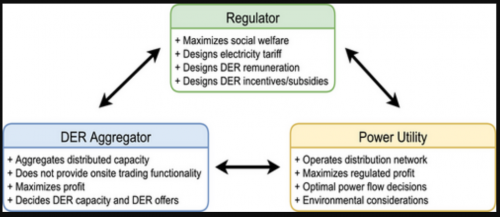Integration of Distributed Energy Resources (DERs) in power systems exacerbates the existing information problems between power utilities and regulators. DER policies oblivious to the trilemma of information asymmetry between power utilities, DER aggregators, and regulators result in distorted price signals to DER investors, and socially inefficient DER roll-out. Therefore, in this paper, a game-theoretic approach is proposed for modeling information asymmetry in distribution network information and consumer data between the DER aggregators and the power utilities. The proposed framework is based on Single Leader Single Follower (SLSF) games, reformulated as Mathematical Programs with Equilibrium Constraints (MPECs), and solved using the Scholtes's relaxation technique. The results, based on the 7-bus Manhattan power network, show that unless the DER aggregators have complete information about the distribution network characteristics, the welfare along with the realized installed capacity of DERs in the system decreases. Moreover, progressively decreasing DER investment costs alleviate the effects of information asymmetry, suggesting that early adopters face disproportionately high welfare losses attributed to incomplete information between the DER stakeholders. Hence, policy interventions to alleviate the rampant information problems are imperative to ensure an optimal DER roll-out.

